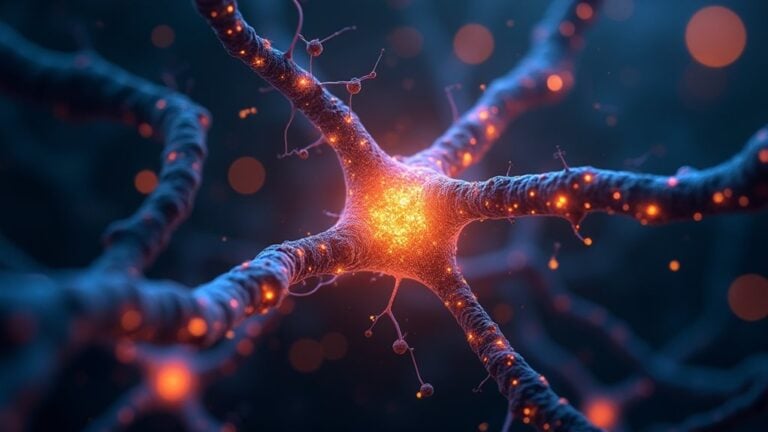Magnesium is gaining attention as a natural approach to managing ADHD symptoms in children, offering a potential alternative or complement to traditional treatments. Some studies suggest kids with ADHD might have lower magnesium levels, which could play a role in focus and behavioral challenges.
Parents exploring this option often ponder about the right dosage, safest forms, and realistic expectations questions that become clearer when examining the science behind how magnesium supports brain function. Understanding more about this mineral’s role opens up practical ways to integrate it into a child’s routine while balancing safety and effectiveness.
Understanding the Role of Magnesium in ADHD
How does magnesium actually aid kids with ADHD? Magnesium plays a crucial part in brain functioning, and research suggests diminished levels may exacerbate symptoms like hyperactivity and poor focus in children with attention-deficit hyperactivity disorder.
Studies demonstrate magnesium supplementation can enhance behavior by supporting neurotransmitter equilibrium, which helps modulate mood and concentration. Kids with ADHD frequently have lower magnesium levels, and increasing intake—whether through diet or supplements—may soothe restlessness and amplify cognitive function.
While additional investigation is required, some parents report noticeable enhancements in attention and reduced impulsivity after consistent magnesium use. The mineral’s calming effect on the nervous system renders it a promising supportive option, though it shouldn’t supplant prescribed treatments without medical counsel. Comprehending its role assists families explore safe, natural ways to manage ADHD symptoms.
Prevalence of Magnesium Deficiency in Children With ADHD
- Processed diets: Many children with ADHD consume foods stripped of magnesium, like refined grains and sugary snacks.
- Stress impact: ADHD-related stress can deplete magnesium, creating a cycle that aggravates symptoms.
- IQ and behavior links: Low magnesium levels in children correlate with higher hyperactivity and lower cognitive scores.
Disclaimer : Without Doctor consult , you can’t take this and first talk with your doctor first.
Research Findings on Magnesium Supplementation for ADHD
Research has shown that children with ADHD often have lower magnesium levels compared to those without the condition.
Several studies suggest that magnesium supplementation could help reduce symptoms like hyperactivity and inattention, particularly if combined with other nutrients like vitamin D.
However, more long-term research is needed to confirm these findings and establish proper dosing guidelines.
Deficiency Prevalence Studies
While many factors contribute to ADHD symptoms, studies reveal a surprising connection between the condition and magnesium deficiency. Research shows that ADHD children often have lower magnesium levels, which could worsen hyperactivity, inattention, and oppositional behavior.
- High Deficiency Rates: Up to 96% of ADHD children in some studies were magnesium deficient, with an Egyptian study finding 72% deficiency rates.
- Impact on Behavior: Lower magnesium levels correlate with increased hyperactivity and lower IQ scores, suggesting a direct link to cognitive and behavioral challenges.
- Supplementation Benefits: Combining magnesium supplementation with vitamin B6 has displayed promise in reducing symptoms, though further research is needed to confirm long-term effects.
These findings highlight the importance of checking magnesium levels in ADHD children, as targeting deficiencies could support better focus and behavior.
Symptom Improvement Evidence
Because magnesium plays a pivotal role in brain function, its effect on ADHD symptoms has become a central focus of research. Studies show magnesium supplementation can drastically reduce hyperactivity, inattention, and oppositional behavior in children with ADHD. One study found a 90% drop in hyperactivity and 66% improvement in focus after magnesium use.
Combining magnesium with vitamin B6 could further ease aggression and sleep issues. Research also links magnesium deficiency to worse ADHD symptoms, with lower levels often seen in affected kids. A meta-analysis confirmed that ADHD patients typically have lower magnesium levels than their peers, supporting its potential benefits.
While more research is needed, these findings suggest tackling magnesium deficiency could help manage ADHD symptoms in children.
Potential Benefits of Magnesium for ADHD Symptoms
Magnesium supplementation can help children with ADHD through improving their ability to focus and pay attention during daily activities. It could also diminish restless behaviors like hyperactivity and impulsivity, facilitating their ability to remain calm and engaged.
Additionally, enhanced sleep quality from magnesium might sustain overall mood and cognitive function, which often struggles in kids with ADHD.
Improves Focus and Attention
For kids with ADHD, maintaining focus can feel like trying to catch a buzzing fly—just as they ponder they’ve got it, it darts away once more. Magnesium supplementation can help steady their attention through supporting brain function.
Research shows magnesium plays a key role in regulating neurotransmitters like dopamine, which are often imbalanced in ADHD symptoms in children. A deficiency might worsen inattention, while proper levels can sharpen focus and attention.
- Brain chemistry boost: Magnesium helps stabilize dopamine and serotonin, neurotransmitters critical for concentration.
- Study-backed results: One trial found a 66% reduction in inattention after magnesium supplementation.
- Deficiency link: Low magnesium levels correlate with poorer focus and higher hyperactivity in kids.
Reduces Hyperactivity and Impulsivity
Many children with ADHD struggle with restless energy and impulsive actions, making daily tasks feel overwhelming. Magnesium supplementation could help by handling underlying magnesium deficiency, which is linked to worsened hyperactivity and lower IQ scores. Research shows significant improvements in hyperactivity, inattention, and oppositional behavior with magnesium intake, with some studies reporting up to a 90% reduction in hyperactive behaviors. This mineral supports executive function, helping kids control impulsive reactions.
| Symptom | Improvement with Magnesium |
|---|---|
| Hyperactivity | Up to 90% reduction |
| Inattention | 66% less frequent |
| Oppositional Behavior | 33% decrease |
| Impulsive Actions | Better self-control |
Supports Better Sleep Quality
Children with ADHD often battle not just daytime symptoms but restless nights, where falling and staying asleep feels impossible. Magnesium supplementation can help regulate sleep-wake cycles, easing common sleep problems like delayed sleep onset and frequent nighttime wakings. Through supporting the production of serotonin and melatonin—key hormones for relaxation—magnesium can improve overall sleep quality in kids with ADHD.
- Faster Sleep Onset: Magnesium calms the nervous system, helping children fall asleep quicker.
- Fewer Nighttime Wakings: It stabilizes brain activity, reducing disruptions during the night.
- Balanced Sleep-Wake Cycles: Proper magnesium levels help align natural sleep rhythms, promoting deeper rest.
For parents seeking natural solutions, magnesium provides a promising way to address sleep struggles tied to ADHD, potentially leading to better daytime focus and behavior.
Safety Considerations and Possible Side Effects
While magnesium is often considered safe for managing ADHD symptoms in kids, there are some precautions to keep in mind. Magnesium supplementation can cause mild side effects like stomach cramps, nausea, or diarrhea, especially if taken in high doses. Though rare, an overdose might lead to serious issues like irregular heartbeat or even cardiac arrest.
The National Institutes of Health advises medical supervision to guarantee safety, particularly when combining magnesium with ADHD medication, as interactions can occur. Parents should monitor their child’s response and adjust the dosage if loose stools or discomfort arise. Starting with smaller amounts and gradually increasing can help minimize risks. Always consult a doctor before introducing magnesium to avoid unintended complications.
Recommended Magnesium Dosage for Children With ADHD
How much magnesium should a child with ADHD take to see benefits without risking side effects? While research on magnesium supplementation for ADHD in children is limited, studies suggest doses between 100-300 mg of magnesium per day, depending on age and weight. A randomized controlled trial used 6 mg magnesium/kg body weight, showing promise for symptom improvement. However, individual needs differ, and lower amounts might be safer to commence.
Absorption matters: Only 30-40% of dietary magnesium gets absorbed, so children supplemented may need slightly higher doses than the RDA.
Age-based adjustments: Younger kids (1-3 years) benefit from smaller amounts (80-100 mg), while teens may require closer to adult doses (300-400 mg).
Monitor impacts: Magnesium as a potential ADHD aid works best with consistent use—track behavior changes and adjust if required.
Parents should discuss supplementation in children with a doctor to find the appropriate balance. Magnesium help varies by child, so gradual testing guarantees safety.
Choosing the Right Form of Magnesium Supplement
Finding the right magnesium dosage is only part of the equation—the type of supplement matters just as much. For children with ADHD, magnesium supplementation should focus on forms with better absorption, like magnesium glycinate or citrate, which are gentler on the stomach.
Oral magnesium citrate is affordable and effective, while other options, such as taurate or malate, could offer additional benefits but cost more. Since only 30-40% of dietary magnesium is absorbed, supplements can help meet the recommended dietary allowance, especially if a plant-based diet isn’t sufficient.
However, consulting a healthcare professional is crucial to avoid interactions with ADHD medications. The appropriate form of magnesium guarantees better results without unnecessary side effects, making it a key part of managing symptoms.
Combining Magnesium With Other Nutritional Interventions
Since magnesium isn’t the only nutrient that could help with ADHD, pairing it with other key supplements could potentially make a larger difference. Research shows that combining magnesium supplementation with vitamin D, omega-3 fatty acids, or iron supplementation might improve ADHD symptoms more effectively than using magnesium alone.
- Vitamin D & Magnesium: A 2020 study found children taking both showed better focus and mood than with just one.
- Omega-3s: Systematic reviews suggest these fats support brain function, possibly easing hyperactivity when paired with dietary magnesium.
- Iron Matters: Low iron levels are linked to ADHD, and supplementation could help, though more studies are needed.
A balanced diet rich in these nutrients might enhance ADHD management alongside proper supplementation.
Practical Tips for Incorporating Magnesium Into Daily Routine
Many parents looking for ADHD support find that adding magnesium to their child’s routine works best as it’s simple and consistent. Starting with a low magnesium dosage—around 100–200 mg daily—helps gauge tolerance before adjusting.
Liquid magnesium glycinate or chelate forms are easier to absorb than oxide or sulfate, making them preferable choices for magnesium as ADHD treatment. Taking magnesium with food improves magnesium absorption and reduces stomach discomfort. Including dietary magnesium sources like spinach, almonds, or pumpkin seeds boosts intake naturally.
Pairing magnesium and vitamin B6 can amplify its calming effects. Practical tips for magnesium include mixing liquid supplements into smoothies or offering magnesium-rich snacks like yogurt with nuts. Consistency matters—incorporating it into meals or bedtime routines secures steady benefits.
Conclusion
Research suggests magnesium deficiencies occur in over 70% of children with ADHD, a startling statistic highlighting this mineral’s potential role in symptom management. While not a standalone cure, magnesium supplementation offers a safe, natural approach to supporting attention and behavior as soon as combined with other treatments. Parents interested in exploring this option should work closely with healthcare providers to determine appropriate dosing and monitor their child’s response across time.




